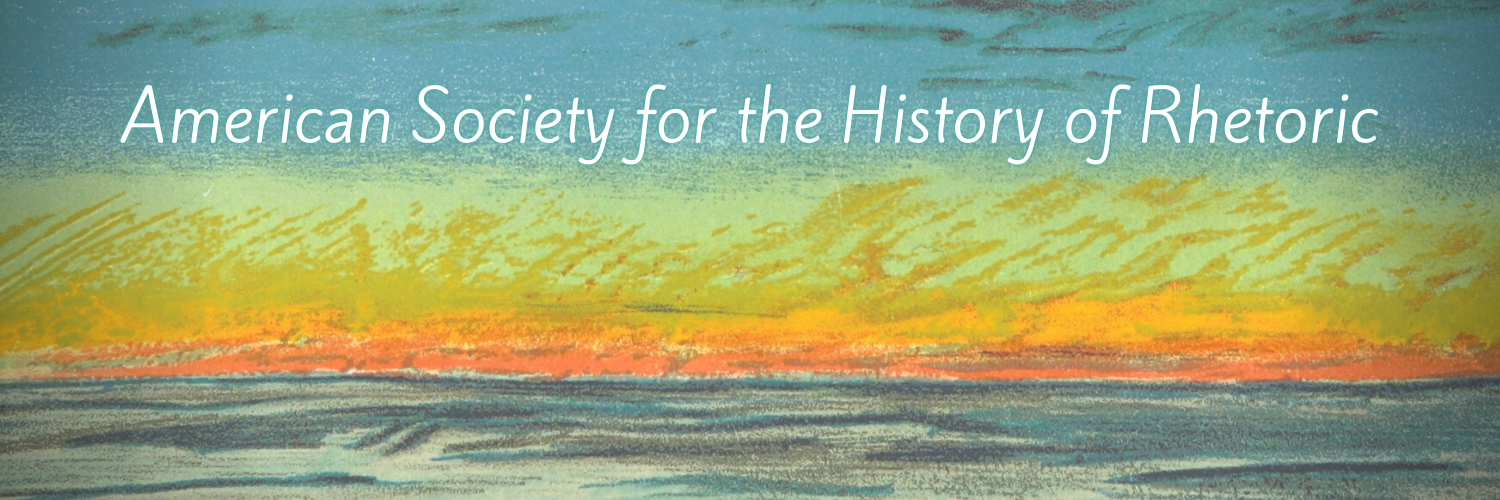In this interview, I speak with former ASHR president Susan Jarratt about her new book manuscript on the Second Sophistic, the importance of foregrounding historiographical questions in historical research, and the enduring appeal of Sappho. Jarratt is professor emerita of Comparative Literature at the University of California, Irvine. She earned her Ph.D. at the University of Texas at Austin.
Jordan Loveridge: First of all, thank you so much for agreeing to this interview. Your book Rereading the Sophists: Classical Rhetoric Refigured was among the first that introduced me to the history of rhetoric as a discipline. Can you tell me about how you became interested in the history of rhetoric? What initially drew you to the field, and how would you describe your main research areas?
 Susan Jarratt: I came into the field through my experiences as a high school teacher of writing. In the 70s I taught high school in San Antonio, Texas, and many of my students were struggling with academic English. During my Master’s program at the University of Texas at San Antonio, I was introduced to the then-new ideas about teaching writing as a process; they completely changed my approach to writing students. At the same time, I took a course in literary theory including works by Plato and Aristotle. I was drawn to ancient Greek culture and ideas about language. When I got into the PhD program at the University of Texas at Austin, these two experiences came together under the heading of “rhetoric.” In that program it was possible to connect composition, the history of rhetoric, and literary theory and criticism through the brilliance and generosity of an amazing faculty. Returning to the Greeks in James Kinneavy’s course in classical rhetoric I had an urge to somehow get behind Plato and Aristotle. Professor Kinneavy aimed me toward the first sophists, and they became the subject of my dissertation and first book. I love the way their very diverse writings raise questions about language and power, the consequences of unquestioned cultural stories, the ethics and techniques of teaching, and the pleasure of artistry and play.
Susan Jarratt: I came into the field through my experiences as a high school teacher of writing. In the 70s I taught high school in San Antonio, Texas, and many of my students were struggling with academic English. During my Master’s program at the University of Texas at San Antonio, I was introduced to the then-new ideas about teaching writing as a process; they completely changed my approach to writing students. At the same time, I took a course in literary theory including works by Plato and Aristotle. I was drawn to ancient Greek culture and ideas about language. When I got into the PhD program at the University of Texas at Austin, these two experiences came together under the heading of “rhetoric.” In that program it was possible to connect composition, the history of rhetoric, and literary theory and criticism through the brilliance and generosity of an amazing faculty. Returning to the Greeks in James Kinneavy’s course in classical rhetoric I had an urge to somehow get behind Plato and Aristotle. Professor Kinneavy aimed me toward the first sophists, and they became the subject of my dissertation and first book. I love the way their very diverse writings raise questions about language and power, the consequences of unquestioned cultural stories, the ethics and techniques of teaching, and the pleasure of artistry and play.
My interests have expanded over the decades: I’ve worked in feminist pedagogy and gendered approaches to rhetoric as well as in historiography—ideas about how and why history is written as it is given differences in gender, race, class, geography, religion, and other contexts. Those perspectives have led me to continue trying to crack open “classics” as a fixed cluster of ancient texts maintained with privileged status. And, taking the problem from a different direction, how have all sorts of people taken up this seemingly elite, exclusive cultural commodity and made it their own? Rhetoric has provided a very useful path into those questions.
JL: What are your current research projects? Do they relate to or build from your previous work?
SJ: Last fall I completed a book manuscript titled Chain of Gold: Greek Rhetoric in the Roman Empire. I’m continuing with my interest in the sophists: from first sophists to second. As with the first project, I’m questioning our canon but here in the post-classical era. The typical trajectory of study for ancient rhetoric takes us from classical (5th-4thC BCE) Greece to Republican and then imperial Rome with Cicero and Quintilian. But the Greeks don’t just disappear, obviously. So what happens to Greek rhetoric and those who practice it under Roman conquest? My title gives a short answer: a few privileged second sophists flourish while bound by a “chain of gold”: Roman imperial power that rewards and constrains them at the same time. The thesis of the book is that they speak back to empire through figured discourse.
This question seemed important to me for contemporary reasons as well disciplinary ones. With the fall of the Soviets post-1989, and then in the Bush era post-9/11, an American imperial presence has surged forward without apology. Bush’s national security policy statements actually refer to a pax Americana. It seemed to me that we could use the perspectives of an earlier group of politically, rhetorically astute imperial subjects – namely, the second sophists – in the face of this political situation. What I’m also doing with this project, as you can see, is suggesting a shift in attention in ancient rhetoric studies from the pedagogical to the political. Not that any of this is completely new: a number of brilliant scholars have been working on the second sophists for a couple of decades. But I’m hoping my readings of Dio Chrysostom, Aristides, Philostratus, and Libanius will be of interest. And the chapter on a Greek novel—probably a new genre for most rhetoric scholars—adds some spice to the project.
JL: (Interested readers can find some excerpts here they may also want to review Jarratt’s “Sophistopolis as Cosmopolis: Reading Post-Classical Greek Rhetoric.” Advances in the History of Rhetoric 14.1 (2011): 65-82, which forms a part of the manuscript).
SJ: I’m also working very hard with a group of six other editors to create the Norton Anthology of Rhetoric and Writing. This is a huge, long-term project that will, I think, change the way scholars in our field see its history. We all hope we live long enough to see it completed!
JL: Not only does that seem like a huge project, it also seems like a huge moment for the discipline of rhetoric. With that in mind, what advice would you give to a graduate student beginning work in the history of rhetoric? Are there questions a new scholar should keep in mind as they conduct their PhD research?
SJ: First I would say, great choice! Next, I would say, go with your passion. People are attracted to periods or figures, some of which/whom may seem unpromising or over-worked or obscure or perhaps unfashionable given the scholarly trends of the day. But there is always another angle of vision possible. There are so many lost geographies, as Neil Smith puts it, waiting to be discovered and searched. But it’s very important to keep the historiographical question at the forefront: how and why are you telling this story? There are lots of new objects around to find, but our searches are always interested, in the strong sense, and often in ways we have to work at teasing out. That search must be a part of the project.
I’d also like to recommend giving yourself permission to become immersed in another language and culture, using the disciplinary resources from adjacent fields. The symposium in late May will highlight some comparative scholars (thanks, Scott Stroud!), and there are so many more areas and languages awaiting rhetorical investigation and analysis. I’m especially eager for new work in Arabic and in African languages and cultures.
JL: What do you like best about ASHR? Why should someone become involved with the organization?
SJ: I love the size and intimacy of ASHR. It’s such a welcoming group. It’s the only conference I attend with a dedicated plenary session: everyone in the same room all day (and part of the next) working on common issues. This is such an important way to advance our understanding and support new scholars.
JL: I completely agree. Few organizations offer the chance for scholars at different stages of their careers to come together in this way. To conclude, I want to ask a question I have enjoyed asking all of our interviewees: who is one of your favorite figures from the history of rhetoric?
SJ: I think I will go with Sappho for this occasion. I’ve just been writing a headnote on her excerpts for the Norton Anthology, so she’s on my mind. She has all the features that drew me to the sophists with the added attraction of being a woman. She was a public intellectual in her archaic city: a consummate artist of logos in the lyric form, a musician, perhaps a political trouble-maker, and probably a teacher. She’s a three-dimensional figure, dispensing favors unevenly among her young acolytes. And she has a powerful relationship with the goddess Aphrodite, her “fellow-fighter” in the agons of eros. Her fragments stay with me, echoing in my head: “Let me tell you this: someone in some future time will think of us” (Fr. 60, Barnard trans.). There is a whole history of rhetoric right there.
About the Interviewer: Jordan Loveridge is Assistant Professor of Communication and English at Mount Saint Mary’s University in Emmitsburg, Maryland. He earned his Ph.D. in Rhetoric from Arizona State University, focusing specifically on medieval rhetorics. His work appears in venues such as Philosophy and Rhetoric, Community Literacy Journal, and Advances in the History of Rhetoric.
